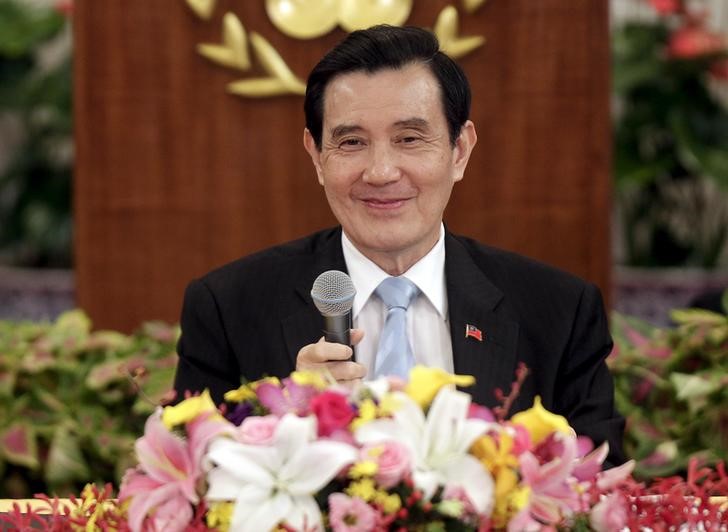By J.R. Wu and Ben Blanchard
TAIPEI/BEIJING (Reuters) - As Taiwan President Ma Ying-jeou was being peppered with reporters' questions ahead of his historic meeting with China's leader, Chinese state television was showing a dreary press conference on industrial reform.
Patiently taking some 50 questions from Taiwanese and foreign media on Thursday, the democratically elected Ma stands in contrast to Chinese President Xi Jinping, who almost never answers questions from reporters and who was anointed leader by a tiny core within the ruling Communist Party.
When the two hold talks in Singapore on Saturday in the first such meeting since the end of the Chinese civil war in 1949, the stark difference in political cultures will be on display.
On Ma's flight to Singapore will be Taiwanese and foreign reporters. The foreign press is never allowed to fly with Chinese leaders.
Details about the meeting have also been handled very differently.
By Thursday morning, less than 36 hours after the surprise midnight announcement of the meeting, the line-up of the 14 government officials attending, seven from each side, had been reported in two of Taiwan's major dailies.
Another widely read newspaper, the Apple (O:AAPL) Daily, splashed on its front page a factbox about Xi, listing his date of birth - he is three years younger than Ma - the names of his wife, daughter and father, his schooling and his previous jobs.
Xi's resume was boxed in red, while Ma's was in blue.
Beijing on the other hand has not said who will attend the meeting besides the leaders nor held any open press events to explain its position.
China's Taiwan Affairs Office, which handles relations with the island, did not respond to a request for comment.
NO FACEBOOK FOR XI
Chinese state-run media has covered the news, but made almost no mention of the concerns over the meeting expressed by Taiwan's main opposition Democratic Progressive Party, whose candidate is favoured to win presidential elections in January.
The meeting has been "widely supported" by all walks of life in Taiwan, Chinese state television reported on Wednesday.
Taiwan's democratic reform process, which started in the 1970s, has made the self-ruled island one of the world's most vibrant and free-wheeling societies.
China's Communist Party by contrast brooks no dissent, keeps a tight rein on state-run media, does not allow free elections and blocks popular foreign websites such as Facebook (O:FB) and Google (O:GOOGL).
Taiwan elections are always sensitive in China, worried the democratic winds from across the Taiwan Strait could cause people to wonder why their own government won't allow free polls.
Taiwan's presidential office has a Facebook page and several spokespeople who reporters can reach by cellphone. There is no equivalent in China, where questions to government departments typically have to be made by fax and, foreign reporters especially, rarely get replies.
Ma knows he is under the microscope.
Critics, concerned that China is using economic ties to gain influence over Taiwan, are getting louder in local and national politics. Beijing has never renounced the use of force to take back what it considers a renegade province.
"We urge the Legislative Yuan to recall Ma," said Freddy Lim, a well-known human rights activist, referring to parliament.
Lim, who was protesting on Wednesday in front of government offices, and other Ma opponents see the weekend meeting as another "secret" pact the ruling pro-China Nationalists party is making with Beijing.
A trade in services pact that was agreed to by both sides was ultimately blocked last year in Taiwan by hundreds of thousands of protesters accusing the Ma government of a "black box" approach to negotiations with China.
Ma has said his meeting with Xi would not involve private promises.
In his 90-minute press conference, Ma was questioned about his motivation for meeting Xi: Was it an election ploy to revive his party's fortunes? Was it to leave a legacy before he steps down under the island's term limits?
"This is not about an election, but is based on the consideration of the happiness of the next generation," Ma said.
He was even asked why his wife, Chow Mei-ching, was not going.

"It is not that I don't want to take her. She does not want to come with me," he said.